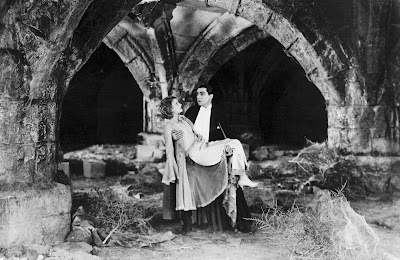In front of the Jane Pickens Theatre in Newport, R.I., where I accompanied 'Dracula' (1931) on Tuesday, Oct. 29.
This year's Halloween Season Silent Film Steeplechase concludes tonight with a Lon Chaney double feature: 'The Unknown' (1927) and 'West of Zanzibar' (1928).
Both films will be shown on Wednesday, Oct. 30 at 7 p.m. at the Rex Theatre in downtown Manchester, N.H. More details in the press release pasted in below.
It's a compelling pair of movies that feature Chaney in two of his physically most demanding roles.
In 'The Unknown,' he's Alonzo the Armless, a circus knife-thrower forced to use his legs instead of hands, which he lacks. In 'West of Zanzibar,' he plays Phroso the Magician, who loses the use of his legs in an accident, but who still travels to Africa to get revenue on the man (Lionel Barrymore) who stole his wife.
It's often observed that Chaney put his whole body into his portrayals, with his work in title roles of 'The Hunchback of Notre Dame '(1922) and 'Phantom of the Opera' (1925) often cited as examples.
But 'The Unknown' and 'West of Zanzibar' take this one step further. In each film, Chaney plays characters who are denied the full use of their bodies. Instead, he must work around serious physical limitations.
The result, with macabre director Tod Browning helming both films, are portrayals that rank among the most extreme of all mainstream cinema of any era. They must be seen to be believed, and even then you may not believe what you're seeing.
Which all makes for a great Halloween experience! So I hope you'll join me this evening at the Rex Theatre for a show you won't forget—even if you try!
* * *
MONDAY, OCT. 21, 2024 / FOR IMMEDIATE RELEASE
Contact Jeff Rapsis • (603) 236-9237 • jeffrapsis@gmail.com
Lon Chaney Halloween 'Creepfest' double feature at Rex Theatre on Wednesday, Oct. 30
Among
Chaney's most challenging roles: In 'The Unknown,' he's without arms;
in 'West of Zanzibar,' he's paralyzed from the waist down
MANCHESTER, N.H.—Get into the Halloween spirit with classic silent thrillers starring legendary actor Lon Chaney.
A pair of movies starring Chaney, 'The Unknown' (1927) and 'West of Zanzibar'
(1928), combine for a creepy double feature on Wednesday, Oct. 30
at 7 p.m.
at the Rex Theatre, 23 Amherst St., Manchester, N.H.
General admission is $10 per person; tickets are available at the door or online at www.palacetheatre.org.
'The Unknown' (1927) features Chaney as "Alonzo the Armless," a circus knife-thrower with a dark past who uses his feet to perform his act. The film co-stars a very young Joan Crawford.
In 'West of Zanzibar' (1928), Chaney plays a vaudeville magician who seeks revenge after becoming paralyzed from the waist down. The film co-stars Lionel Barrymore.
Both films were produced by MGM and directed by Tod Browning, who specialized in exploring the dark and creepy side of circus life. Browning's career later culminated with his bizarre early talkie film 'Freaks' (1932), starring a cast of deformed carnival performers.
Lon Chaney is today regarded as one of the most versatile and powerful actors of early cinema, renowned for his characterizations of tortured, often grotesque and afflicted characters, and his groundbreaking artistry with makeup.
Chaney remains famous for his starring roles in such silent horror films as 'The Hunchback of Notre Dame' (1923) and 'The Phantom of the Opera' (1925). His ability to transform himself using makeup techniques he developed earned him the nickname "The Man of a Thousand Faces."
But Chaney starred in dozens of other films throughout the silent era, many of them aimed at the growing appetite among movie audiences for the strange, macabre, or downright weird.
In 'The Unknown,' Chaney's character "Alonzo the Armless" is indeed without both arms. This forces him to use his feet to perform tasks that range from throwing knives in his circus act to smoking a cigarette. In one scene, Chaney uses his feet to strum a guitar.
'West of Zanzibar' requires Chaney to play his role without using his legs. When not using a wheelchair, he uses his hands and arms to crawl across floors.
To modern viewers, the passage of time has made these unusual films seem even more strange and otherworldly.
It's an atmosphere that silent film accompanist Jeff Rapsis will try to enhance by improvising live music on the spot for the screenings.
A very young Joan Crawford comforts an armless Lon Chaney in 'The Unknown' (1927). Notice the lit cigarette between Chaney's toes.
"Many
of the Lon Chaney features seem to get creepier as more time goes by,"
said Rapsis, who is based in New Hampshire and ranks as one of the
nation's leading silent film accompanists. "Today, they're a great way
to celebrate Halloween and the power of silent film to transport
audiences to strange and unusual places."
Both films are suitable for all family members, but the overall program may be too much for very young children to enjoy.
Modern critics say 'The Unknown' still packs a powerful cinematic punch.
The
film "...revels in the seedy circus life, and creates some incredible
set pieces, from Chaney's knife-throwing act to a sinister, cavernous
doctor's lab,” wrote Jeffrey M. Anderson of Combustible Celluloid.
'The
Unknown’ (1927) and 'West of Zanzibar' (1928) will be shown on
Wednesday, Oct. 30
at 7 p.m.
at the Rex Theatre, 23 Amherst St., Manchester, N.H.







































